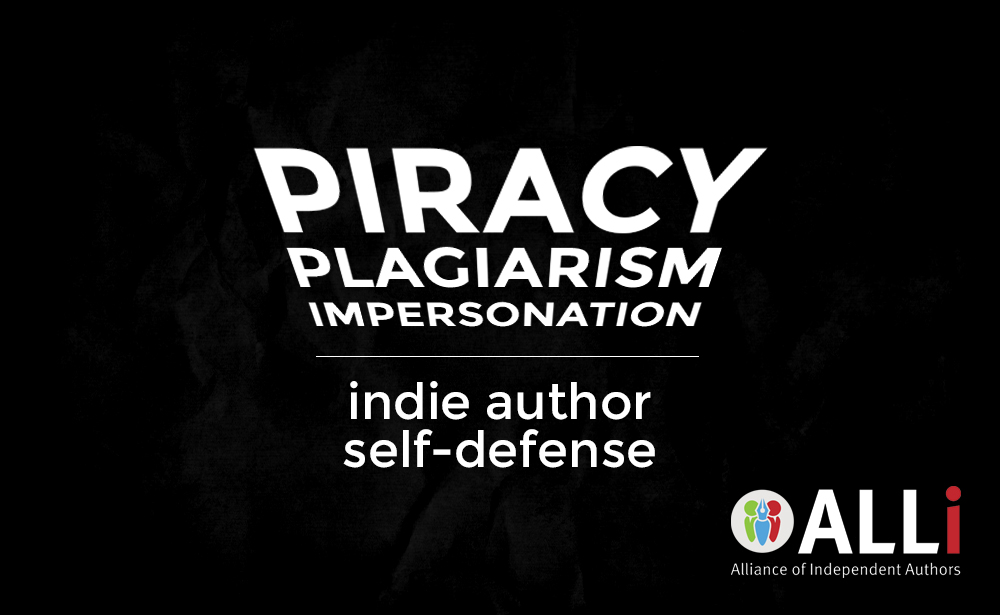To view the most up to date post on this topic, please read: Is Copyright Broken? Part 1 – The Indie Author's Guide to Managing Piracy
Digital crime has been on the rise, and indie publishers are not immune. If a thief is profiting illegally from your writing, your options for putting a stop to it will depend on the nature of the infringement. In this three-part series, we'll look at the most common forms of copyright infringement and how you can fight back against them.
Part One: Piracy
It happens to every author sooner or later: you're searching the web for mentions of your book, and on the very first page of search results, some vile excuse for a human being is handing out illegal copies of your work. Shock, rage, and frustration follow.
Piracy is the unlawful copying of your work, and it's the most common form of content theft.
However, there's good news: only a tiny fraction of the piracy you find on the web is actually piracy. Most pirate websites don't actually have stolen content. They use software to gather titles, covers, and descriptions from Amazon or other retailers to use as bait. Then they set up a convincing storefront on the web which claims to offer those books, usually free or for a ludicrously low “all you can eat” subscription.
However, when a greedy fly wanders into this spider's web, they discover the real price. These operations are fronts for malware distribution, credit card scams, identity theft, affiliate link schemes, or all of the above. There are no free books, and all the victim gets for their trouble is a malfunctioning computer and a decimated credit score.
One popular con is the “recurring billing” scam. The site supposedly offers a free trial, but requires users to enter their credit card information. “You can cancel at any time,” the site promises. The victim discovers that their book isn't really available on the site, and they promptly cancel.
Three months down the road, the victim finds that they're still being billed each month without their consent, and the website operator is unreachable.
Do not visit a pirate website to confirm whether your books are there, as this puts your computer at risk.
Fighting Back
If most pirate sites don't have the books they claim to, is it worth trying to stop them?
In this author's opinion, chasing down pirates that most likely aren't infringing on your copyright or cutting into your sales is wasteful. That's time and effort better spent on writing, editing, refining your marketing, polishing your book descriptions, or a hundred other activities that contribute in a more meaningful way to your prosperity.
On the other hand, many authors feel that having their name associated with a scam could harm their brand, even if their books are not being pirated. Others simply can't abide having a thief or a con artist exploit their hard work.
If you fall into one of the latter categories, the DMCA takedown notice is your weapon of choice. DMCA stands for Digital Millenium Copyright Act, a US law that requires internet service providers to remove infringing content. The DMCA only has jurisdiction over companies operating in the US, but that includes both Google, Microsoft, and Yahoo!, which collectively account for 96.3% of English-language internet searches.
The SFWA offers a simple DMCA generator to help you draft a takedown notice, but identifying the right contacts can be time consuming.
A service like Blasty can greatly simplify the process of confronting infringers. Blasty submits a takedown notice to Google, Yahoo!, Bing, and the site hosting the infringing content.
I've been skeptical of Blasty's value in the past, but the service has evolved to address many of my initial concerns. It now offers a potent means of suppressing copyright infringements. It's not a panacea as many of these sites operate outside of the DMCA's jurisdiction and can only be hidden from search engines, but if you must confront a piracy scam, Blasty is the quickest and easiest way of doing so.
Join us on Thursday, March 8th for Part Two of this series, Plagiarism, and the story of one courageous author who held her plagiarist accountable.
Over to You
What are your views on piracy? Is it a victimless crime? Let us know in the comments below!





Thank you for sharing information. I’ve already had to use a DMCA note…a publisher never paid me for any of my sales. I ended up asking for my rights back. One of my stories found a new home (plus I revised it a lot), but the original version was still up at Google Play. Fortunately a friend and a fellow author shared information on the DMCA. It’s really helpful to have each other’s back at such times!
If most sites aren’t actually stealing, what does Blasty do? Also, the sites I have seen with my pirated content have been eu or co.uk sites. Any advice?
I’ve been using Blasty since it was in beta. I’m just now discovering its usefulness since I found my newest release on iBooks under a different publisher. I’ve been in touch with iBooks to challenge it, but I also submitted the link to Blasty.
I’ve been a Blasty user since the early days when it was in Beta testing. It works, and keeps on working. It searches automatically for pirate copies of my books and Blasts them. 2,521 completed so far and 50 more in progress. I love Blasty.
I can endorse Blasty, too. Makes a nuisance job much more effective.